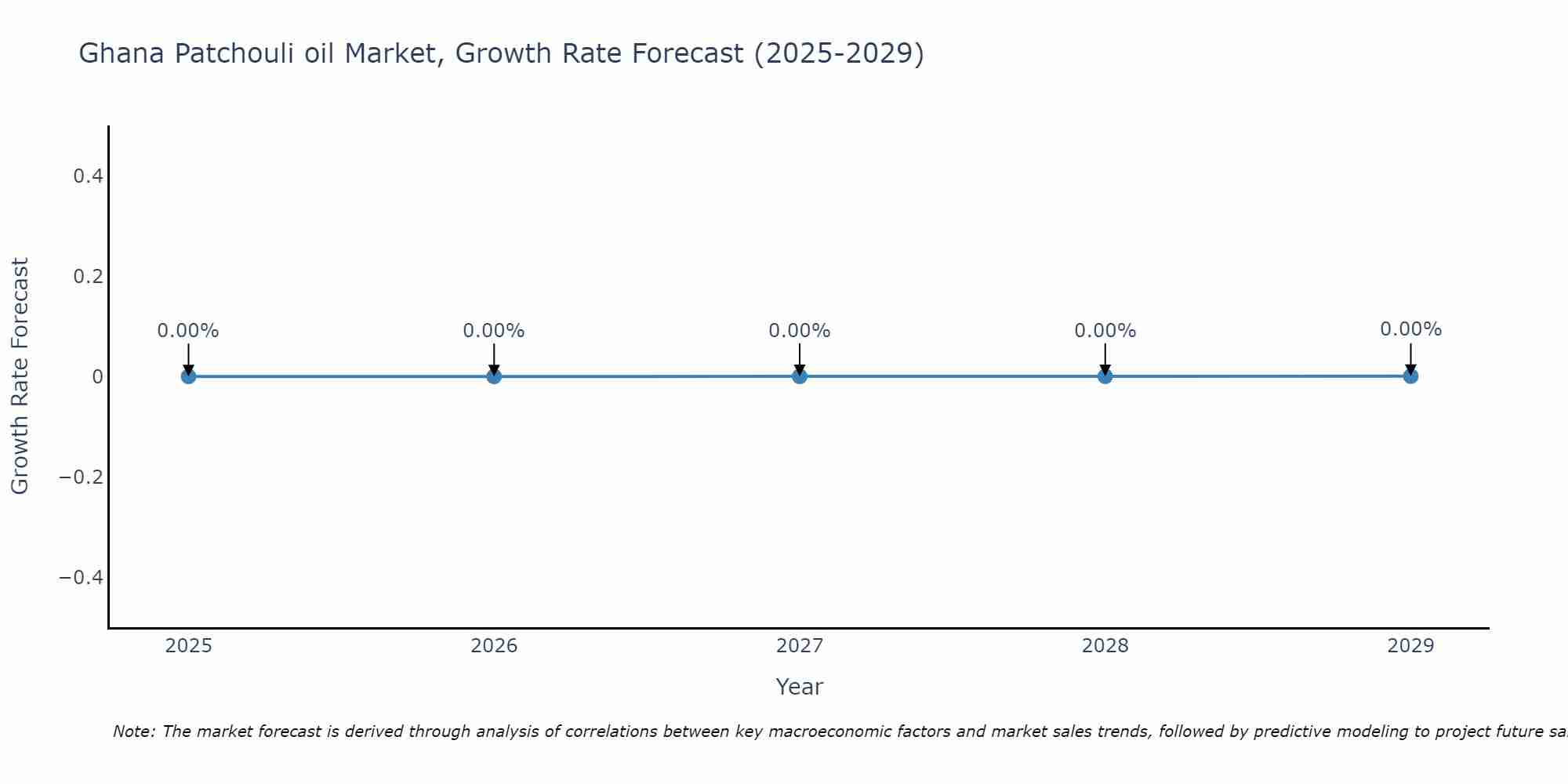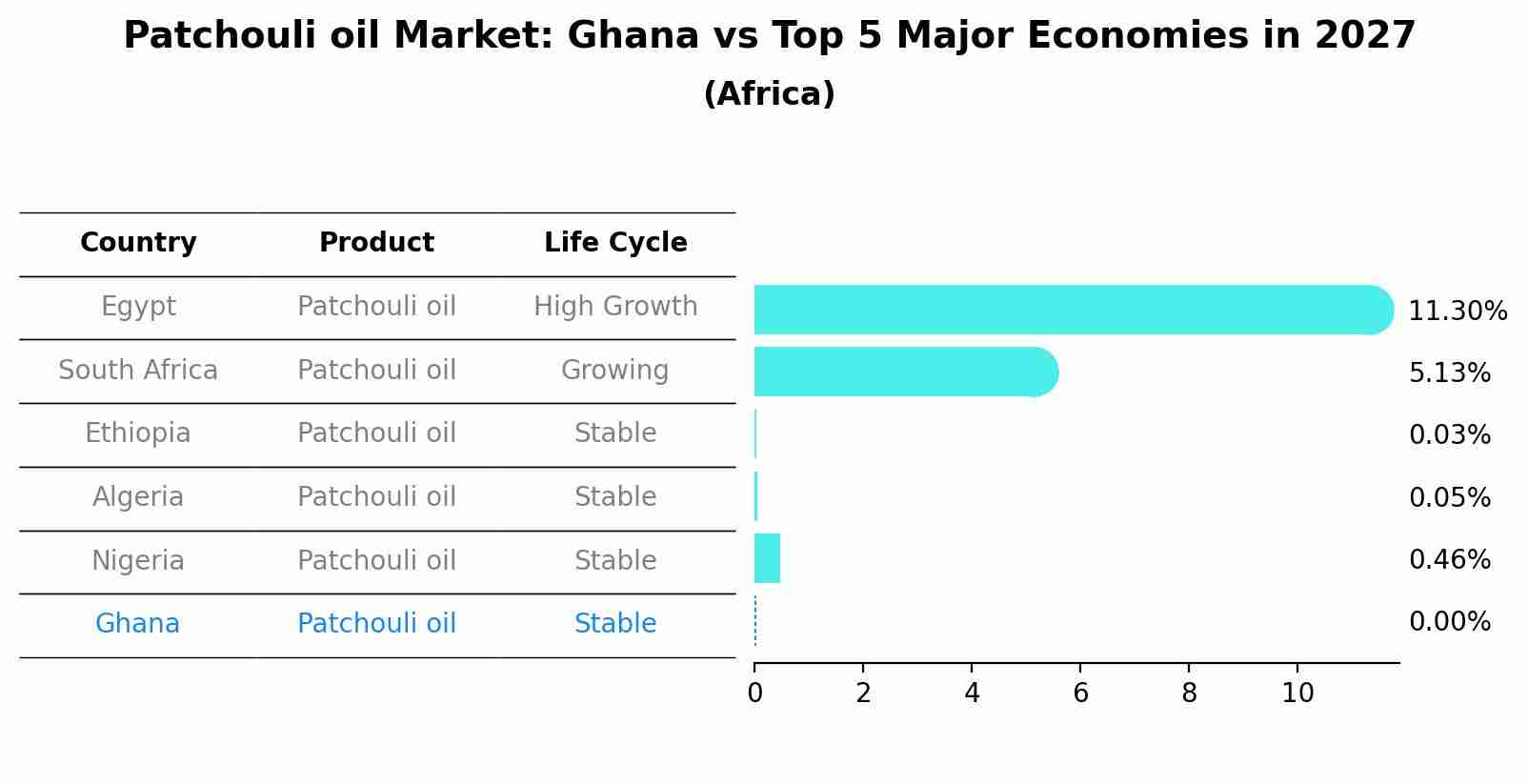Ghana Patchouli oil Market (2025-2031) Outlook | Value, Companies, Growth, Forecast, Industry, Size, Trends, Share, Revenue & Analysis
| Product Code: ETC093915 | Publication Date: Jun 2021 | Updated Date: Jun 2025 | Product Type: Report | |
| Publisher: 6Wresearch | Author: Bhawna Singh | No. of Pages: 70 | No. of Figures: 35 | No. of Tables: 5 |
Ghana Patchouli oil Market Size Growth Rate
The Ghana Patchouli oil Market is likely to experience consistent growth rate gains over the period 2025 to 2029. Commencing at 0.00% in 2025, growth builds up to 0.00% by 2029.

Patchouli oil Market: Ghana vs Top 5 Major Economies in 2027 (Africa)
In the Africa region, the Patchouli oil market in Ghana is projected to expand at a stable growth rate of 0.00% by 2027. The largest economy is Egypt, followed by South Africa, Ethiopia, Algeria and Nigeria.

Ghana Patchouli oil Market Overview
The Ghana Patchouli oil market is experiencing steady growth driven by increasing demand for natural and sustainable personal care and fragrance products. Patchouli oil is prized for its unique earthy and musky aroma, making it a popular ingredient in perfumes, cosmetics, and aromatherapy products. Ghana`s tropical climate provides an ideal environment for cultivating Patchouli plants, resulting in high-quality oil production. The market is characterized by a mix of small-scale farmers and larger commercial producers, with a focus on organic and fair trade practices gaining traction. As consumer awareness of the benefits of Patchouli oil continues to rise, the market is expected to expand further, presenting opportunities for both domestic consumption and international exports.
Ghana Patchouli oil Market Trends
The Ghana Patchouli oil market is experiencing growth due to increasing demand for natural and organic products in the beauty and personal care industry. Consumers are drawn to the earthy and exotic scent of Patchouli oil, which is believed to have aromatherapy benefits such as reducing stress and promoting relaxation. The market is also benefiting from the rising popularity of essential oils for use in skincare, haircare, and perfumes. Additionally, there is a growing awareness among consumers about the sustainability and ethical sourcing of Patchouli oil, leading to a preference for products that are produced using environmentally friendly practices. Overall, the Ghana Patchouli oil market is expected to continue growing as more consumers seek natural alternatives in their daily routines.
Ghana Patchouli oil Market Challenges
In the Ghana Patchouli oil market, some of the key challenges faced include inconsistent quality due to varying agricultural practices and processing methods among different suppliers, which can impact the overall reputation and demand for Ghanaian Patchouli oil. Additionally, limited access to modern technology and infrastructure for cultivation, extraction, and distribution can hinder the efficiency and scale of production. Fluctuating global demand and prices for Patchouli oil also pose challenges for Ghanaian producers in terms of market competitiveness and profitability. Furthermore, issues related to sustainability, such as environmental concerns and ethical sourcing practices, are becoming increasingly important in the market and require attention to meet evolving consumer preferences and regulatory requirements. Addressing these challenges will be crucial for the long-term growth and success of the Ghana Patchouli oil market.
Ghana Patchouli oil Market Investment Opportunities
In the Ghana Patchouli oil market, there are attractive investment opportunities due to the increasing global demand for natural essential oils in industries such as cosmetics, aromatherapy, and perfumery. Patchouli oil is known for its unique scent and therapeutic properties, making it a sought-after ingredient in various products. Investing in Patchouli oil production in Ghana offers the potential for high returns, as the country has conducive climate conditions for cultivating Patchouli plants. Additionally, Ghana`s reputation for producing high-quality agricultural products can provide a competitive advantage in the global Patchouli oil market. Collaborating with local farmers and leveraging sustainable farming practices can further enhance the investment prospects in this growing industry.
Ghana Patchouli oil Market Government Policy
Government policies related to the Ghana Patchouli oil market focus on promoting sustainable cultivation practices, ensuring fair trade practices, and supporting local farmers. The government emphasizes the importance of organic farming methods to meet international quality standards and increase export potential. Additionally, there are policies in place to regulate pricing, quality control, and the distribution of Patchouli oil within the domestic market. The government also offers incentives and support programs to encourage small-scale farmers to engage in Patchouli cultivation as a means of boosting rural economies and reducing poverty levels. Overall, the government`s policies aim to create a conducive environment for the growth and development of the Ghana Patchouli oil market while ensuring environmental sustainability and social welfare.
Ghana Patchouli oil Market Future Outlook
The Ghana Patchouli oil market is expected to experience steady growth in the coming years due to the increasing demand for natural and sustainable ingredients in the fragrance and personal care industries. Patchouli oil`s unique earthy and musky aroma has gained popularity in perfumery, aromatherapy, and skincare products. With Ghana being one of the major producers of high-quality Patchouli oil, the country is well-positioned to capitalize on this growing trend. Factors such as rising consumer awareness about the benefits of natural products, a shift towards clean beauty, and the expansion of the aromatherapy market are likely to drive the demand for Patchouli oil in Ghana. Additionally, the government`s support for the cultivation and production of essential oils further enhances the growth prospects for the Ghanaian Patchouli oil market.
Key Highlights of the Report:
- Ghana Patchouli oil Market Outlook
- Market Size of Ghana Patchouli oil Market, 2021
- Forecast of Ghana Patchouli oil Market, 2031
- Historical Data and Forecast of Ghana Patchouli oil Revenues & Volume for the Period 2021 - 2031
- Ghana Patchouli oil Market Trend Evolution
- Ghana Patchouli oil Market Drivers and Challenges
- Ghana Patchouli oil Price Trends
- Ghana Patchouli oil Porter's Five Forces
- Ghana Patchouli oil Industry Life Cycle
- Historical Data and Forecast of Ghana Patchouli oil Market Revenues & Volume By Type for the Period 2021 - 2031
- Historical Data and Forecast of Ghana Patchouli oil Market Revenues & Volume By Dark Patchouli Oil for the Period 2021 - 2031
- Historical Data and Forecast of Ghana Patchouli oil Market Revenues & Volume By Light Patchouli Oil for the Period 2021 - 2031
- Historical Data and Forecast of Ghana Patchouli oil Market Revenues & Volume By Application for the Period 2021 - 2031
- Historical Data and Forecast of Ghana Patchouli oil Market Revenues & Volume By Perfumery for the Period 2021 - 2031
- Historical Data and Forecast of Ghana Patchouli oil Market Revenues & Volume By Medicine for the Period 2021 - 2031
- Historical Data and Forecast of Ghana Patchouli oil Market Revenues & Volume By Flavorings for the Period 2021 - 2031
- Historical Data and Forecast of Ghana Patchouli oil Market Revenues & Volume By Others for the Period 2021 - 2031
- Ghana Patchouli oil Import Export Trade Statistics
- Market Opportunity Assessment By Type
- Market Opportunity Assessment By Application
- Ghana Patchouli oil Top Companies Market Share
- Ghana Patchouli oil Competitive Benchmarking By Technical and Operational Parameters
- Ghana Patchouli oil Company Profiles
- Ghana Patchouli oil Key Strategic Recommendations
Frequently Asked Questions About the Market Study (FAQs):
- Single User License$ 1,995
- Department License$ 2,400
- Site License$ 3,120
- Global License$ 3,795
Search
Thought Leadership and Analyst Meet
Our Clients
Related Reports
- Afghanistan Rocking Chairs And Adirondack Chairs Market (2026-2032) | Size & Revenue, Competitive Landscape, Share, Segmentation, Industry, Value, Outlook, Analysis, Trends, Growth, Forecast, Companies
- Afghanistan Apparel Market (2026-2032) | Growth, Outlook, Industry, Segmentation, Forecast, Size, Companies, Trends, Value, Share, Analysis & Revenue
- Canada Oil and Gas Market (2026-2032) | Share, Segmentation, Value, Industry, Trends, Forecast, Analysis, Size & Revenue, Growth, Competitive Landscape, Outlook, Companies
- Germany Breakfast Food Market (2026-2032) | Industry, Share, Growth, Size, Companies, Value, Analysis, Revenue, Trends, Forecast & Outlook
- Australia Briquette Market (2025-2031) | Growth, Size, Revenue, Forecast, Analysis, Trends, Value, Share, Industry & Companies
- Vietnam System Integrator Market (2025-2031) | Size, Companies, Analysis, Industry, Value, Forecast, Growth, Trends, Revenue & Share
- ASEAN and Thailand Brain Health Supplements Market (2025-2031) | Strategy, Consumer Insights, Analysis, Investment Trends, Opportunities, Growth, Size, Share, Industry, Revenue, Segments, Value, Segmentation, Supply, Forecast, Restraints, Outlook, Competition, Drivers, Trends, Demand, Pricing Analysis, Competitive, Strategic Insights, Companies, Challenges
- ASEAN Bearings Market (2025-2031) | Strategy, Consumer Insights, Analysis, Investment Trends, Opportunities, Growth, Size, Share, Industry, Revenue, Segments, Value, Segmentation, Supply, Forecast, Restraints, Outlook, Competition, Drivers, Trends, Demand, Pricing Analysis, Competitive, Strategic Insights, Companies, Challenges
- Europe Flooring Market (2025-2031) | Outlook, Share, Industry, Trends, Forecast, Companies, Revenue, Size, Analysis, Growth & Value
- Saudi Arabia Manlift Market (2025-2031) | Outlook, Size, Growth, Trends, Companies, Industry, Revenue, Value, Share, Forecast & Analysis
Industry Events and Analyst Meet
Whitepaper
- Middle East & Africa Commercial Security Market Click here to view more.
- Middle East & Africa Fire Safety Systems & Equipment Market Click here to view more.
- GCC Drone Market Click here to view more.
- Middle East Lighting Fixture Market Click here to view more.
- GCC Physical & Perimeter Security Market Click here to view more.
6WResearch In News
- Doha a strategic location for EV manufacturing hub: IPA Qatar
- Demand for luxury TVs surging in the GCC, says Samsung
- Empowering Growth: The Thriving Journey of Bangladesh’s Cable Industry
- Demand for luxury TVs surging in the GCC, says Samsung
- Video call with a traditional healer? Once unthinkable, it’s now common in South Africa
- Intelligent Buildings To Smooth GCC’s Path To Net Zero


















